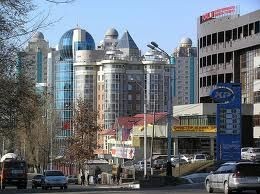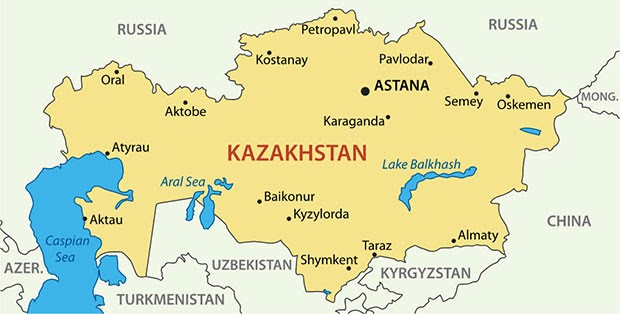ALMATY (TCA) — There is a tough competition in Kazakhstan’s taxi market, with the new taxi app players and unlicensed taxi drivers competing for each customer on the streets of the largest Kazakh cities. We are republishing this article by Almaz Kumenov on the issue, originally published by EurasiaNet.org:
By Central Asian standards, Almaty has long been considered an expensive city. But the city’s taxi drivers may beg to differ: these days, you can get across the center for as little as a couple of dollars.
Kazakhstan is slowly crawling out of a slump induced in large part by falling oil prices, but this bellwether of the real economy tells a less straightforward story.
Aidyn, 53, an unlicensed taxi driver in Almaty, takes his passengers to work at rush-hour for just one dollar. Eurasianet.org has withheld Aidyn’s surname as unlicensed service workers fear the attention of tax inspectors.
“My passengers don’t get bored in traffic jams. I tell them jokes and interesting stories. My clients are happy that instead of being shoved about in a crowded bus they get to work in a warm car. And I barely charge them anything,” Aidyn told Eurasianet.
There are a few reasons for the low cost of taxis, not just in Almaty, but all across Kazakhstan. Foremost among them is the slide endured by the national currency over the second half of 2015, when the tenge slipped from 190 to around 380 to the dollar. Devaluation was accompanied by strict instructions from the government to enforce price controls on basic food items. The result has been a substantial fall in the cost of many goods and services in foreign currency terms.
The cost of taking taxis, however, has even fallen in tenge terms due to increasing competition. Taking a trip by car in most cities in Kazakhstan costs anywhere between 200 tenge ($0.60) and 2,000 tenge ($6) — the latter typically being the cost of a drive to the airport.
Most competitive of all are the “independent” taxi drivers. These drivers — bombila in their Russian nickname — are a staple of many post-Soviet cities, but seem particularly dominant in Kazakhstan. According to unofficial estimates, there are half a million people who will give rides in their car for some extra income. For a country of 18 million that is a remarkable number.
Because grabbing an unlicensed taxi is as easy as raising a hand while standing on the side of the road, official competitors, whose cars can take several minutes to reach a customer, struggle to compete.
One response from the authorities has been to pursue the punitive route. Police claim that they regularly stop bombila and slap fines of up to 45,000 tenge ($134) for tax avoidance.
The war on illegal drivers is cast as an effort to protect citizens’ interests.
“Many times, when the bombila are carrying female passengers, there have been disputes, and the customers have nowhere to address their complaints,” Bekmyrza Igenberdinov, the head of City Hall’s Transport Department in the capital, Astana, told reporters in September.
But for those who depend on income from operating a taxi illegally, the risk is acceptable. Aidyn said that being in his early 50s and unemployed, he has few other options. Every morning, he drives his minivan along a route picking up office managers at an appointed hour and takes them to their workplaces. “I’m lucky. I have regular passengers and a guaranteed daily income. I offer them a good tariff, I always arrive on time and they are pleased with that,” he told Eurasianet.
Even with taxi prices plummeting to seemingly impossible lows, two important market players arrived on the scene in the summer of 2016 — Uber and Russian-owned Yandex Taxi. The race to the lowest price intensified with these two companies around. In the first few months after they arrived, it became possible to take a 10-kilometer ride for around $1.
Aggressive pricing policies have given Uber and Yandex Taxi a dominant share in the taxi app market, according to industry specialists, although the picture is a little murky since the companies do not disclose how many users they each have.
And there is some overlap between the bombila model and the app market, since the former also often rely on an app called InDriver, which enables unlicensed taxis to access an Uber-style roll-call of passengers. While Uber and Yandex Taxi require a degree of standards compliance from the drivers that work with them, however, InDriver adopts a considerably more laissez-faire approach.
Inevitably, old-style taxi companies have been badly hit by all these developments.
Medet Kurmanov, chairman of the Astana Transport Companies Association, a lobbying group, said many taxi companies were pushed into bankruptcy. Out of the ashes, Kurmanov’s association last year oversaw the merging of Astana taxi companies into one brand — Astana Taxi — which is now trying to position itself as the provider of premier services in the city.
“Our cars come in a standard color, they have one dispatch center, one tariff and a uniform for the drivers. We take bank cards, the passengers are covered by insurance and we take responsibility for their security and the quality of service as a whole,” Kurmanov told Eurasianet.
In May, parliament approved legislation recognizing Astana Taxi vehicles as public transportation, thereby granting them access to bus lanes — a potentially decisive factor for attracting clients.
Astana resident Nurlan Mshanov said that he has seen a notable improvement in the quality of official taxis.
“Before, it took so long for taxi services to get cars to customers, and now they arrive and take you to your destination so much faster because they are able to go along empty lanes,” Mshanov said. “The only downside is that they are so expensive.”
In another useful endorsement, Astana City Hall announced on January 2 that it plans to do away with all its service cars and make officials travel by taxi instead. This “will allow for savings to the budget,” city hall said.
Back in Almaty, Aidyn fears that it is only a matter of time before city authorities adopt a cocktail of carrot-and-stick methods — subsidizing legal taxi companies and upping the distribution of fines — to squeeze out unlicensed drivers once and for all. It will be passengers that suffer the most, since they will end up paying more for getting around the city, he contended.
“Authorities make us out as some kind of criminals that passengers should be afraid of. But we aren’t criminals, but just regular people trying to make some money instead of sitting around and complaining that we don’t have jobs,” he said.









